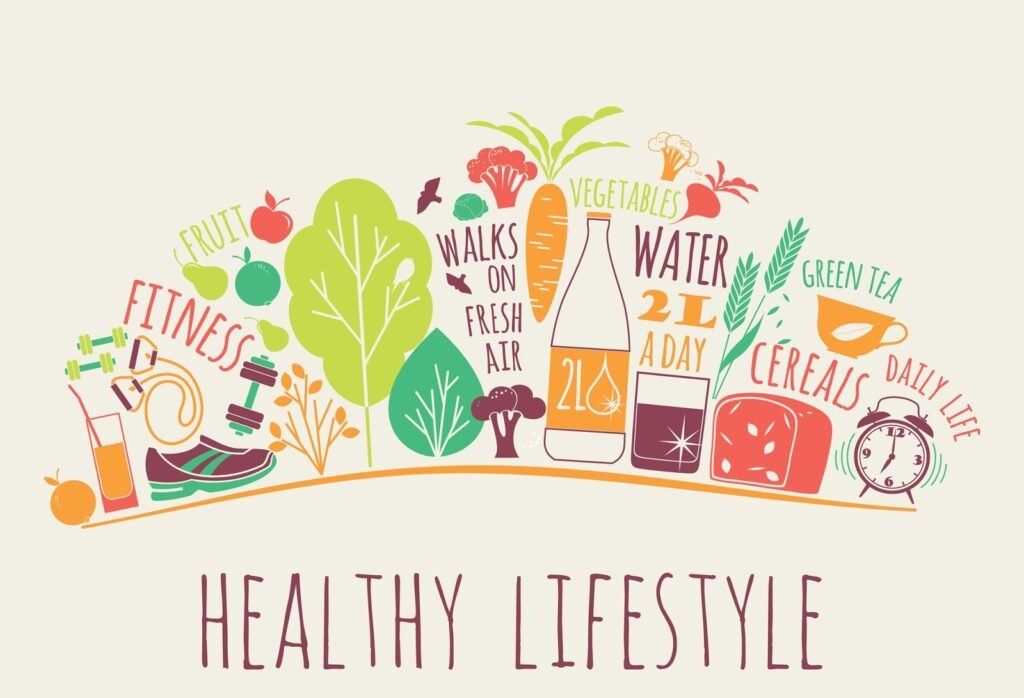In pursuing a My Healthy Lifestyle, adopting a plant-based diet emerges as a transformative choice, offering a myriad of benefits for both our well-being and the environment. Embarking on this journey entails eliminating all animal products, including meat, dairy, and eggs, and embracing a diet centered on whole, unprocessed plant foods.
Unveiling the Health Benefits
A plant-based diet is a nutritional powerhouse, providing an abundance of essential vitamins, minerals, antioxidants, and fiber. This dietary approach has been linked to a reduced risk of chronic diseases such as heart disease, type 2 diabetes, and certain types of cancer. Plant-based foods are naturally low in saturated fat and cholesterol, promoting a healthier heart and reducing the risk of obesity.
Enhancing Environmental Sustainability
Choosing a plant-based lifestyle extends beyond personal health benefits, positively impacting the environment. Animal agriculture is a major contributor to greenhouse gas emissions, water pollution, and deforestation. By opting for plant-based alternatives, we can significantly reduce our carbon footprint and conserve precious natural resources.
Embracing Compassion and Ethics
Adopting a plant-based diet aligns with ethical considerations for many individuals. It promotes compassion towards animals by eliminating the demand for animal products that often involve factory farming practices, which raise concerns about animal welfare. Choosing a vegan lifestyle is a powerful way to advocate for the humane treatment of animals.
Tips for a Smooth Transition
Transitioning to a plant-based diet can be a smooth and enjoyable process with careful planning and support. Start by gradually reducing your intake of animal products and incorporating more plant-based foods into your meals. Experiment with a variety of fruits, vegetables, whole grains, legumes, and nuts to discover new flavors and textures.
Overcoming Challenges
Embracing a plant-based lifestyle may present certain challenges, but they can be easily overcome with the right mindset and resources. One common concern is ensuring adequate protein intake. Plant-based sources such as beans, lentils, tofu, tempeh, and quinoa provide ample protein to meet daily requirements.
Finding Support and Inspiration
Surrounding yourself with a supportive community can make your plant-based journey more enjoyable and successful. Join online forums, connect with local vegan groups, or find a vegan mentor who can offer guidance and inspiration. There are also numerous cookbooks, blogs, and websites dedicated to plant-based cooking, providing a wealth of delicious and nutritious recipes.
Adopting a plant-based diet is a conscious choice that promotes personal well-being, environmental sustainability, and ethical considerations. By embracing the power of plants, we can unlock a healthier, more compassionate, and sustainable lifestyle.
The power of mindfulness: achieving inner peace and well-being
In the pursuit of a healthy lifestyle, mindfulness stands as a transformative practice, empowering us to cultivate inner peace, reduce stress, and enhance overall well-being. Mindfulness involves intentionally directing our attention to the present moment, without judgment or attachment.
- Anchoring in the Present: Mindfulness invites us to let go of the past and future, gently guiding our awareness to the present moment.
- Observing Thoughts and Emotions: We practice observing our thoughts and emotions without getting caught up in their drama, allowing them to flow through us without resistance.
- Non-Judgmental Awareness: Mindfulness encourages us to cultivate a non-judgmental attitude towards our experiences, fostering self-compassion and acceptance.
- Mindful Breathing: Focusing on the breath is a powerful mindfulness technique, anchoring us in the present moment and promoting relaxation.
- Body Scan Meditation: Systematically directing attention to different parts of the body helps us cultivate body awareness and release tension.
- Mindful Movement: Incorporating mindfulness into physical activities, such as yoga or walking, enhances our connection to the body and the present moment.
- Mindful Eating: Eating mindfully involves savoring each bite, paying attention to the taste, texture, and aroma of our food, and promoting mindful eating habits.
- Mindful Communication: Practicing mindfulness in our interactions allows us to be more present and attentive, fostering deeper connections with others.
Integrating Mindfulness into Daily Life
To reap the benefits of mindfulness, it’s essential to integrate it into our daily lives. Start with small, manageable practices, such as taking a few minutes each day to focus on your breath or mindfully savoring your morning coffee.
Overcoming Challenges
Mindfulness is a skill that requires practice and patience. It’s normal to encounter challenges, such as a wandering mind or feelings of restlessness. The key is to gently bring your attention back to the present moment without judgment.
Embracing the Journey
Mindfulness is a transformative journey that leads to greater self-awareness, inner peace, and well-being. By embracing the power of mindfulness, we can cultivate a healthier and more fulfilling life.
Putting exercise first: Discovering the joys of movement

In the whirlwind of our hectic lives, finding solace often feels like an elusive dream. Amidst the chaos, the power of mindfulness emerges as a beacon, guiding us toward inner peace and well-being.
1. Embrace the Present Moment: In the rush of daily life, we often overlook the beauty of the present. Mindfulness urges us to savor each moment, fostering gratitude and enriching our healthy lifestyle.
2. Unplug and Reconnect: Amidst the digital noise, carve out moments to unplug. Whether it’s a stroll in nature or quiet meditation, disconnecting is crucial for cultivating a healthy mind.
3. Breath as an Anchor: The rhythmic inhale and exhale become more than just automatic functions. Mindful breathing becomes a powerful anchor, grounding us in the now and alleviating stress, a cornerstone of my healthy lifestyle.
4. Cultivate Self-Compassion: In our quest for perfection, we often forget to be kind to ourselves. Mindfulness encourages self-compassion, fostering a positive relationship with oneself – a key ingredient for inner peace.
5. Release Judgments: Letting go of preconceived notions and judgments liberates the mind. Mindfulness teaches us to observe without attachment, allowing a more profound understanding of ourselves and others in my healthy lifestyle journey.
6. Gratitude Journaling: Documenting moments of gratitude amplifies positivity. Mindful reflection on the good in our lives enhances our overall well-being, contributing significantly to my healthy lifestyle aspirations.
7. Mindful Eating: Transforming meals into mindful experiences deepens our connection with nourishment. Savor each bite, appreciating the flavors, and fostering a healthier relationship with food – a vital aspect of my healthy lifestyle.
8. Digital Detox Rituals: Establishing daily rituals that signal the end of screen time fosters balance. Mindfulness invites us to be intentional about our technology use, promoting a healthier, more mindful engagement my healthy lifestyle pursuits.
In the tapestry of a busy life, mindfulness stitches threads of tranquility, creating a masterpiece of inner peace and overall well-being. Embrace these mindful practices, weaving them seamlessly into the fabric of your days, and witness the transformative power they bring to my healthy lifestyle journey.
Enhancing Emotional Well-being: Stress Coping and Positive Thinking

In the pursuit of a healthy lifestyle, emotional well-being plays a crucial role. By developing effective stress-coping mechanisms and cultivating a positive mindset, we can navigate life’s challenges with greater resilience and joy.
- Mindful Breathing: Practicing deep breathing exercises helps calm the nervous system and promotes relaxation, reducing stress levels.
- Regular Exercise: Physical activity releases endorphins, natural mood boosters that combat stress and improve overall well-being.
- Adequate Sleep: Prioritizing sufficient sleep allows the body and mind to rest and repair, reducing stress and improving emotional resilience.
- Healthy Diet: Nourishing the body with a balanced diet provides the essential nutrients for optimal brain function and emotional well-being.
- Gratitude Practice: Regularly reflecting on things we’re grateful for shifts our focus towards positivity, fostering a happier mindset.
- Positive Affirmations: Repeating positive statements to ourselves can help rewire our thoughts and cultivate a more positive self-image.
- Surrounding Yourself with Positivity: Spending time with supportive and uplifting individuals can significantly boost our emotional well-being.
- Seeking Professional Help: If stress or negative emotions become overwhelming, don’t hesitate to seek support from a therapist or counselor.
Conclusion:
By embracing the power of plants, mindfulness, and a positive mindset, we can unlock a healthier, more compassionate, and sustainable lifestyle. This holistic approach to well-being nourishes our bodies, minds, and spirits, empowering us to live a fulfilling and balanced life. As we embark on this journey of self-discovery and transformation, let’s embrace the principles of my healthy lifestyle and create a world where wellness thrives for all.
Question on “My Healthy Lifestyle”
What is a healthy and unhealthy lifestyle?
A healthy lifestyle involves adopting habits that promote physical, mental, and emotional well-being. It encompasses regular exercise, balanced nutrition, and sufficient sleep. Healthy lifestyles also involve stress management, positive social connections, and avoiding harmful behaviors like excessive alcohol consumption and smoking. On the contrary, an unhealthy lifestyle often includes sedentary habits, poor dietary choices, inadequate sleep, and high-stress levels. Consuming excessively processed foods, engaging in minimal physical activity, and neglecting mental health can contribute to an unhealthy lifestyle. It’s crucial to strike a balance, making conscious choices that prioritize health and vitality while avoiding detrimental habits. Ultimately, a healthy lifestyle is a holistic approach that harmonizes various aspects of well-being for a fulfilling and sustainable life.
How to be healthy?
To maintain a healthy lifestyle, focus on a well-rounded approach. Start by adopting a balanced diet rich in fruits, vegetables, lean proteins, and whole grains. Regular physical activity is crucial; aim for at least 150 minutes of moderate-intensity exercise per week. Prioritize sufficient sleep, aiming for 7-9 hours nightly. Hydration is key, so drink an adequate amount of water daily. Manage stress through mindfulness practices, meditation, or hobbies.
Regular health check-ups and screenings contribute to preventive care. Limit alcohol intake and avoid smoking. Cultivate positive social connections for emotional well-being. Finally, be mindful of your mental health, seeking professional help if needed. Remember, small, consistent changes lead to a healthier lifestyle. It’s about making choices that nurture your body, mind, and spirit for long-term well-being.

